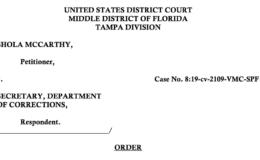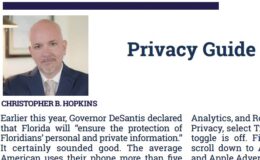“Valid Grounds for Employment Action” Deemed Not Enough for Stalking Injunction under F.S. 784.048 (Klenk v. Ransom)
- By : Cbh
- Category : 1st Amendment, law & order, Privacy

Florida’s First District Court of Appeal held today that a respondent’s behavior may be enough for an “employment action” (presumably, for termination due to sexual harassment) but, in this case, was not enough for the “exacting standard” for an injunction against stalking under Florida Statute 748.048.
The case is Joseph Klenk v. Jessica Ransom.
According to the three-judge opinion:
“These parties had been co-workers for nearly three years when Appellee petitioned for a stalking injunction because of Appellant’s ongoing comments and actions that Appellee felt were sexual harassment. She testified that he frequently made 2 sexually-oriented comments about her body and clothing; and asked her to help him with errands outside of work, provide him with transportation, or meet for lunch. She once caught him looking at messages on her phone when she was out of her office. Appellant denied having sexually harassed Appellee, and explained that a couple of the interactions did occur but were not intended in that manner.”
The Court held that, “even giving credence to Appellee’s testimony… we cannot conclude that the alleged incidents rise to the level of justifying an injunction against stalking. To justify this kind of injunction, the conduct must be bad enough to produce substantial emotional distress in a reasonable person.” The panel quoted a case from last year (2018) which held that “it is not enough to be ‘weirded out’ or uncomfortable.”
The panel concluded, “[a]lthough behavior such as that alleged here can be valid grounds for employment action, it does not rise to the level of 3 conduct justifying a stalking injunction. Accordingly, we must reverse and remand for the trial court to vacate the injunction.”
Of note, the appellee/petitioner was not represented by counsel. Injunctions for stalking and cyberstalking can be difficult both to prosecute and defend, particularly since these can involve constitutional issues as well as very personal situations. Make sure that you are represented by a competent lawyer in your jurisdiction; ask questions and make sure the lawyer understands the statute, has experience in these cases, and fully understands the constitutional implications.
Image credit: Wikimedia


